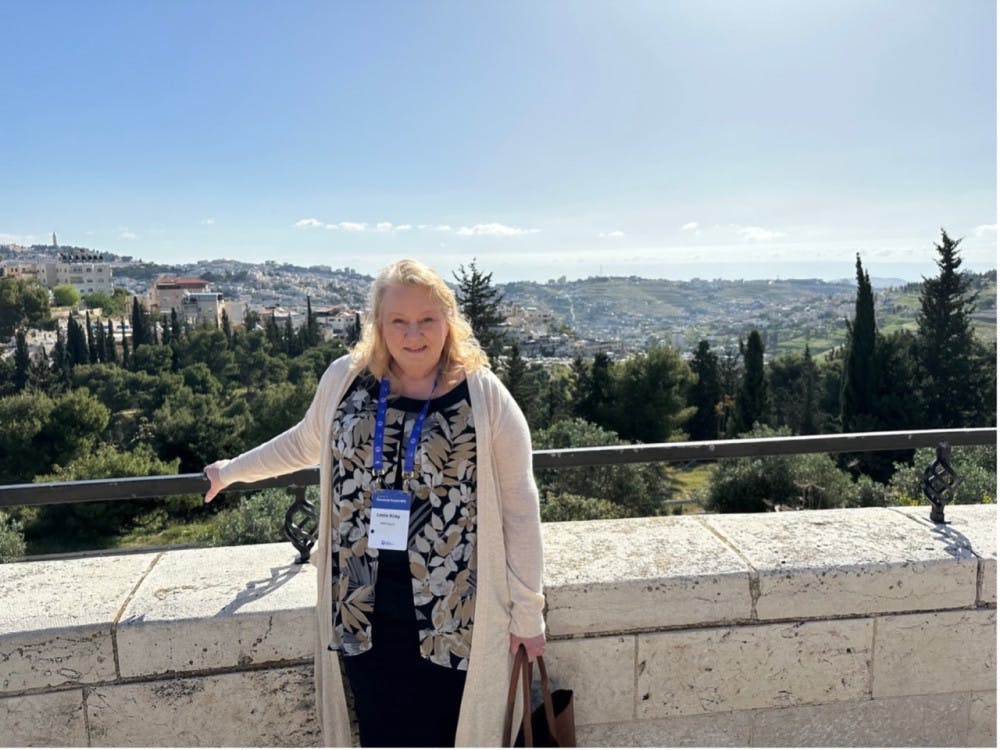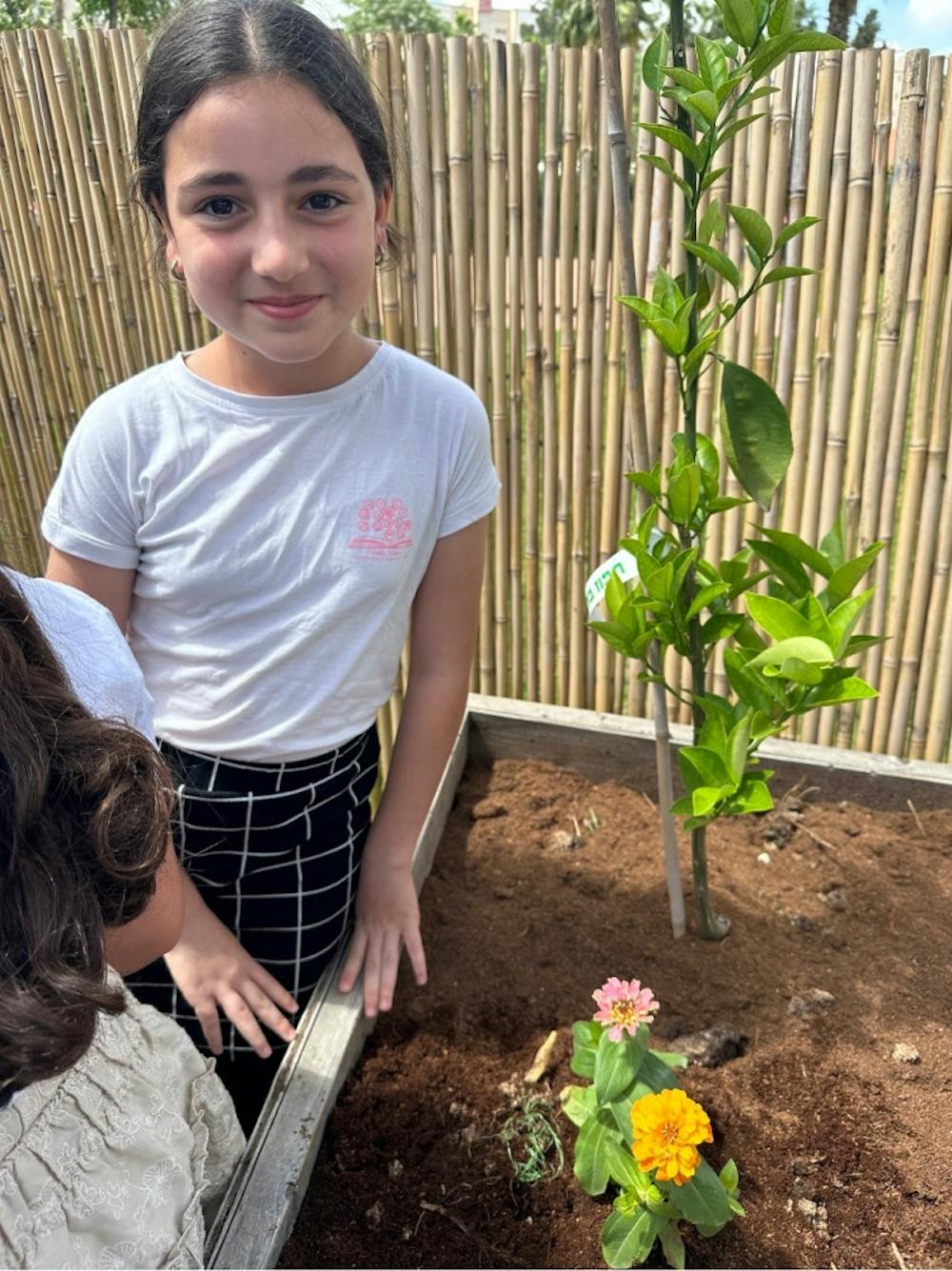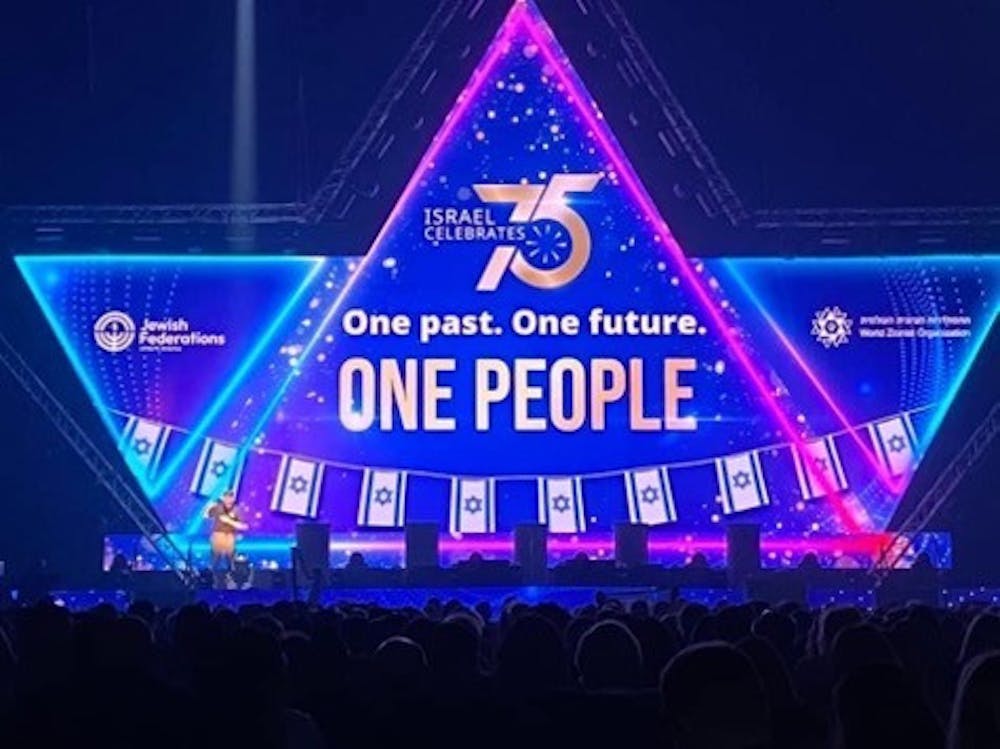
Jewish Federation of Greater Nashville president Leslie Kirby at FeelBeit in Jerusalem.
I spent an amazing, intense two weeks in Israel last month. For the first week, I joined the National Leadership mission through Jewish Federations of North America (JFNA), and then attended the General Assembly (GA). The second week was our Partnership Steering Committee meeting in Hadera-Eiron. This month I’m going to focus on the mission and the GA, and then in next month’s Observer, focus on the Partnership region meeting.
The National Mission was incredible. I was honored to be representing Nashville in this group of approximately 25 professionals and lay leaders from across the US. The focus of the trip was Federation in action - visiting sites around Israel that are supported by Federations and seeing the direct collective impact of our donations.
We started off with a visit to the Eshel program for optimal aging. In response to a growing number of older citizens, this initiative provides courses and training to provide older adults with the tools and resources to continue enjoying their lives to the fullest. The focus is on aging in place to the extent possible and provides both tangible needs and a strong social network to fight the loneliness that older people often feel. We met with some of the program beneficiaries and got to participate in one of their programs, which included dancing - even the people with walkers or canes! Two of the participants were in Israel in 1948 when the state was founded, and their stories of listening to the radio when the Declaration of Independence was first read and dancing in the streets to celebrate were incredibly moving.
We then visited Ohel Meir school in Afula, where we learned about the Youth Futures program. Youth Futures pairs at-risk children and teens along with their families with personal mentors who teach them life/coping skills. Participants in the program have a higher graduation rate than the national average. I liked that the program focuses on the strengths of the child, rather than trying to fix what's "wrong" with them. My partner during our visit to Ohel Meir was Talia. She has profound social anxiety, which strikes a chord with me because my daughter does as well, and I've seen firsthand how debilitating it can be. Talia couldn't even introduce herself to me at first, her mentor had to do it for her. She could barely look me in the eye. But she warmed up over the course of our visit, especially over the delicious falafel lunch they gave us. At the end of our visit, Talia and I planted a flower together in their Resilience Garden. Not gonna lie, when she gave me a hug as I was leaving and said "Shalom, Leslie", I kinda lost it.

Talia with our flower in the resilence garden at her school.
Our next stop was the “First Home in Homeland” refugee program in Merhavia, designed to help Jews from around the world make Aliyah and establish their first home in Israel. The program is specifically focused on settling immigrants in small communities in the Galilee and the Negev regions of Israel, which are often underpopulated and in need of development. Merhavia is one such community in the Lower Galilee region, and the program helps new immigrants from former Soviet countries that fled the Russian-Ukrainian war by providing support, including housing, employment assistance, language classes, and cultural activities. We heard from the coordinators of the program and three immigrant families, one from Russia, one from Belarus and one from Ukraine. The Ukrainian family crossed through Poland to get to Israel, using the same border crossing my son and I visited when we were in Poland working with Ukranian refugees last summer. We visited Jaljulia, a city in the central district of Israel, east of Tel Aviv, to learn about the social-economic circumstances of Arab communities. The city has a population of around 11,000 people and is predominantly made up of Palestinian Arab citizens of Israel. Jaljulia faces many socioeconomic and infrastructure challenges. Despite these challenges, the city has a strong sense of community and a rich cultural heritage. Many of Jaljulia’s residents are involved in local organizations and activities that promote social and cultural development. We toured the village, saw the “peace” graffiti wall on the local police station and visited the Al Rawda Mosque. The mosque serves as an important religious and social center for the city's Muslim community, hosting daily and weekly prayers, religious ceremonies during major Islamic holidays. It also serves as a hub for educational cultural and charitable activities, providing social service support to the local community, including food and clothing donations. The Al Rawda Mosque remains a source of strength and unity for the local community and its leaders and members are committed to promoting interfaith understanding and dialogue, and to working towards a more peaceful and prosperous future for all residents of the city. Afterward, our host kindly invited all of us to his home, where his wife and children had prepared an iftar (meal to break the fast) for us. It was the last night of Ramadan, so it was especially festive. An incredible experience, it left me feeling a lot of hope.
And that was all one day! The next day we headed to Jerusalem, where we visited FeelBeit, a cultural center that offers a wide range of programs and activities aimed at promoting arts, culture, and education, and serves as a hub for creative expression and community engagement. The historic building has been renovated to include performance spaces, art galleries, classrooms, and event spaces. At FeelBeit we joined with JFNA's JEDI mission (Jewish Equity Diversity and Inclusion). It was a fabulous group and we enjoyed lively discussions with local Israelis about the complexity of contemporary life in Jerusalem.
Next stop was the Kotel, where we met with Rakefet Ginsberg, CEO & Executive director of the Masorti Movement in Israel, for a discussion about the situation today at the Kotel regarding prayer for non-orthodox Jews. We had lunch in the Jewish Quarter of the Old City and had time for a bit of retail therapy before heading back to Tel Aviv. We joined congregation Beit Tefila for their beautiful, moving Kabbalat Shabbat at the beach and then had a delicious Shabbat dinner, again with the JEDI group. We also had our first real direct contact with protesters. They were handing out flyers when we went to Shabbat services. Very low key, they were all friendly, their flyers were aimed at Americans and trying to educate us about what's going on with the attempted judicial reforms. There's even a QR code on the flyers where you can make an appointment to "talk to an Israeli about democracy".
Shabbat brought some much-needed rest and relaxation – and beach time! On Sunday we spent the morning working at Leket, Israel’s National Food Bank. Leket is the leading food rescue organization in the country. Their sole focus is rescuing healthy, surplus food and delivering it to those in need through partner nonprofit organizations.
After working (hard!) packing food boxes, we had a short graffiti tour in the Florentin neighborhood of Tel Aviv, before visiting Battae, an Ethiopian cultural center. We had a magnificent Ethiopian meal, heard stories of an Ethiopian oleh and how her family was rescued from Ethiopia, and then one of our mission co-chairs interviewed Micha Feldmann (known as Abba Micha in the Ethiopian community), the director of Project Moses and Project Solomon, which together brought over 22,000 Jewish Ethiopians to Israel.

Opening ceremony at the GA.
After that, the GA began. GA stands for General Assembly, JFNA's annual conference. Every five years the GA is held in Israel, and this year we were there to celebrate Israel's 75th birthday. JFNA always invites both the Prime Minister of Israel and the leader of the opposition to speak at the conference. So, we were scheduled to hear from Netanyahu and Lapid, as well as President Herzog. But in the end, Netanyahu decided last minute not to attend the GA, citing "scheduling issues.” President Herzog gave a very moving speech and announced a major new national dialogue initiative. The GA was a flurry of panels and sessions – including the infamous session with MK Simcha Rothman, one of the primary authors of the proposed judicial reform plan. During that session five people got thrown out by security for protesting. But, like the National Mission, the GA also did a great job of taking people around Israel to see hands-on the work JFNA and our partners are doing.
We were there for both Yom Hazikaron and Yom Ha’atzmaut. On Yom Ha’atzmaut (Israel’s Memorial Day) we attended a memorial service at Latrun, with over 7000 attendees. The service at Latrun is the largest English-language Remembrance Day ceremony in Israel. The theme this year was “Forever Connected,” a powerful reminder of the deep and enduring bonds that connect Jewish people worldwide. On the morning of Yom Hazikaron, a siren sounds for two minutes at 11:00am. During the siren, everything – literally everything – stops. People driving stop their cars and get out and stand in silence beside them. People swimming at the beach stop swimming and stand silently in the water. It was remarkable to see such unity and respect for fallen soldiers and victims of terror.
At sundown, remembrance transitions into festivity, as Yom Ha’atzmaut (Israeli Independence Day) begins. With this year being Israel’s 75th birthday, the celebrations were especially festive, but also tinged with anxiety about the future. Many Israelis are worried that Israel is headed for a civil war (which, as a point of comparison, the US experienced not long after our own 75th birthday). JFNA did a good job focusing on the accomplishments of Israel, and reminding all of us
that we have remained one people both when enduring tragedies and witnessing miracles throughout our 3000+ year history. We continue to share a common heritage and a common future.
During the day on Yom Ha’atzmaut we visited Neot Kedumim, a beautiful biblical nature reserve, and had a traditional Israel barbecue - SO MUCH FOOD! It was the perfect end to the week and offered time for reflection and plans for the future.
Jewish Federations focus on protecting the most vulnerable - in the US and around the world. Spending two weeks in Israel seeing – and participating in – that work firsthand was an experience I will not forget.
The Jewish Observer is published by The Jewish Federation of Greater Nashville and made possible by funds raised in the Jewish Federation Annual Campaign. Become a supporter today.
Check back next month for the second part of the trip, our Partnership steering committee meeting!

